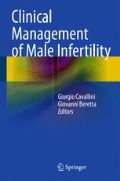Abstract
This chapter encompasses all spermatogenesis-altering conditions affecting the normal male endocrine balance. Such conditions can be caused by either testicular abnormalities (or other endocrine gland or pituitary-hypothalamus disorders) or the effect of exogenous substances (endocrine disruptors).
Access this chapter
Tax calculation will be finalised at checkout
Purchases are for personal use only
References
Isaia GC, Di Stefano M, Borin F, Gola D, Sciolla A (1997) Inquadramento clinico dell’ipogonadismo maschile. In: Molinatti GM, Fontana D (eds) Andrologia. Fisiopatologia e clinica. Verducci Editore, Roma, pp 157–166
Carter JN, Tyson JE, Tolis G, Van Vliet S, Faiman C, Friesen HG (1978) Prolactin secreting tumours and hypogonadism. N Engl J Med 299:847–852
Rajender S, Monica MG, Walter L, Agarwal A (2011) Thyroid, spermatogenesis, and male infertility. Front Biosci 3:843–855
Krassas GE, Poppe K, Glinoer D (2010) Thyroid function and human reproductive health. Endocr Rev 31:702–755
Shoham Z, Zalel Y, Jacobs HS et al (1994) The role of growth hormone in male infertility. Clin Endocrinol 41:1–5
Auger J, Kunstmann JM, Czyglik F et al (1995) Decline in semen quality among fertile men in Paris during the past 20 years. N Engl J Med 332:281–285
Michalakis K, Mintziori G, Kaprara A, Tarlatzis BC, Goulis DG (2013) The complex interaction between obesity, metabolic syndrome and reproductive axis: a narrative review. Metabolism 62:457–478
Gabrilove JL, Nicolis GL, Sohval AR (1974) The testis in Cushing’s syndrome. J Urol 112:95–99
La Vignera S, Condorelli R, Vicari E, D’Agata R, Calogero AE (2012) Diabetes mellitus and sperm parameters. J Androl 33:145–153
Knez J (2013) Endocrine-disrupting chemicals and male reproductive health. Reprod Biomed Online 26:440–448
Sussman EM, Chudnovsky A, Niederberger CS (2008) Hormonal evaluation of the infertile male: has it evolved? Urol Clin North Am 35:147–155
Isidori AM, Giannetta E, Lenzi A (2008) Male hypogonadism. Pituitary 11:171–180
Chua ME, Escusa KG, Luna S, Tapia LC, Dofitas B, Morales M (2013) Revisiting oestrogen antagonists (clomiphene or tamoxifen) as medical empiric therapy for idiopathic male infertility: a meta-analysis. Andrology 1:749–757
Roth LW, Ryan AR, Meacham RB (2013) Clomiphene citrate in the management of male infertility. Semin Reprod Med 31:245–250
Moein MR, Tabibnejad N, Ghasemzadeh J (2012) Beneficial effect of tamoxifen on sperm recovery in infertile men with nonobstructive azoospermia. Andrologia 44(Suppl 1):194–198
Schlegel PN (2012) Aromatase inhibitors for male infertility. Fertil Steril 98:1359–1362
Kaminetsky J, Werner M, Fontenot G, Wiehle RD (2013) Oral enclomiphene citrate stimulates the endogenous production of testosterone and sperm counts in men with low testosterone: comparison with testosterone gel. J Sex Med 10:1628–1635
Paradisi R, Natali F, Fabbri R, Battaglia C, Seracchioli R, Venturoli S (2013) Evidence for a stimulatory role of high doses of recombinant human follicle-stimulating hormone in the treatment of male-factor infertility. Andrologia. doi:10.1111/and.12194
World Health Organization Task Force on the Diagnosis and Treatment of Infertility (1989) Mesterolone and idiopathic male infertility: a double-blind study. Int J Androl 12:254–264
Comhaire F (1990) Treatment of idiopathic testicular failure with high-dose testosterone undecanoate: a double-blind pilot study. Fertil Steril 54:689–693
Author information
Authors and Affiliations
Corresponding author
Editor information
Editors and Affiliations
Rights and permissions
Copyright information
© 2015 Springer International Publishing Switzerland
About this chapter
Cite this chapter
Piubello, G.D. (2015). Endocrine Infertility. In: Cavallini, G., Beretta, G. (eds) Clinical Management of Male Infertility. Springer, Cham. https://doi.org/10.1007/978-3-319-08503-6_14
Download citation
DOI: https://doi.org/10.1007/978-3-319-08503-6_14
Published:
Publisher Name: Springer, Cham
Print ISBN: 978-3-319-08502-9
Online ISBN: 978-3-319-08503-6
eBook Packages: MedicineMedicine (R0)

